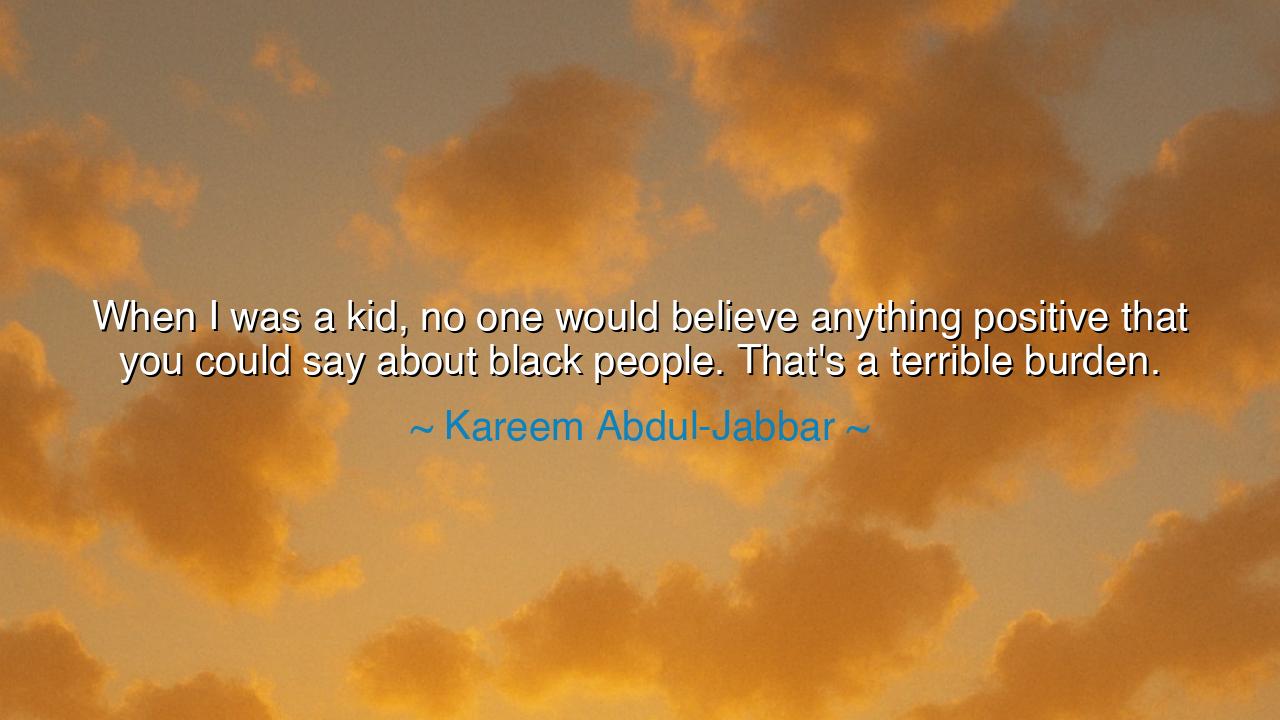
When I was a kid, no one would believe anything positive that
When I was a kid, no one would believe anything positive that you could say about black people. That's a terrible burden.






The words of Kareem Abdul-Jabbar — “When I was a kid, no one would believe anything positive that you could say about black people. That’s a terrible burden.” — rise from the depths of lived sorrow and unshakable truth. They unveil the heavy chains of prejudice, not only binding those who bore them, but poisoning the minds of those who refused to see beyond them. To be told that goodness, brilliance, and virtue are impossible within your people is to live under a shadow that seeks to dim the flame of the soul before it can even burn.
The burden Abdul-Jabbar names is not merely personal, but historical. It is the inheritance of centuries in which the dignity of black men and women was denied by systems built on fear and domination. For a child, to grow knowing that any positive word spoken of his people would be dismissed as falsehood, is to awaken daily to a world already arranged against him. And yet, in naming this truth, Abdul-Jabbar also speaks of resilience — the strength to carry what should never have been placed upon his shoulders.
History gives us countless witnesses to this injustice. Recall Frederick Douglass, born into slavery, who through sheer will taught himself to read and rose to become one of the most powerful voices of his age. In his youth, many would not believe that an enslaved man could possess eloquence or wisdom. Yet his words thundered through America, breaking the lie that nothing positive could come from a black voice. Douglass’s life, like Abdul-Jabbar’s reflection, proves that such disbelief was never truth, but only blindness.
The weight of such disbelief crushes not only individuals but whole communities. It robs children of heroes, distorts history, and tells the oppressed that their worth must forever be proven rather than assumed. Yet it is precisely against this burden that countless black men and women have risen — in art, in sport, in music, in science — each achievement a torch lit against the long night of prejudice. Abdul-Jabbar himself, by his mastery on the court and his wisdom beyond it, stands as one who shattered the chains of disbelief.
Let the generations learn: prejudice is not only an insult to those it targets; it is a blindness that impoverishes all of humanity. To deny the worth of a people is to deny the light they bring to the world. But to honor the positive, to believe in the dignity of every soul, is to unleash greatness where once there was only despair. Abdul-Jabbar’s words endure as both lament and lesson: though the burden was terrible, it was not greater than the spirit that bore it — and in that spirit, the future must find its freedom.






TLAnh Ngoc Trinh Le
Abdul-Jabbar’s quote speaks volumes about the historic and ongoing struggle for racial equality. The weight of constantly having to prove the worth of Black people is a burden no one should bear. How do we create a world where positive contributions from all communities are recognized and celebrated? Is it enough to talk about these issues, or do we need real systemic change to make positive change sustainable?
UGUser Google
Kareem Abdul-Jabbar’s words reveal the deep emotional toll of living in a world where positive images of Black people were silenced. It’s unsettling to realize that such attitudes were once widespread. How do we confront the remnants of these beliefs in today’s society, and what role do education, media, and community leaders play in shifting this narrative? What concrete steps can we take to validate the achievements of marginalized communities?
UGUser Google
This quote from Kareem Abdul-Jabbar brings to light the lasting psychological impact of racism. To have lived in a time where any positive view of Black people was met with disbelief must have been a constant source of frustration and isolation. How do we move forward from this historical burden, and how do we ensure that today’s children don’t have to endure the same challenges in recognizing the worth and dignity of Black people?
Ttranphantuankhoa
Kareem Abdul-Jabbar’s reflection on the disbelief surrounding positive statements about Black people highlights the trauma of systemic racism. The idea that Black excellence and achievements were often ignored or dismissed is both painful and eye-opening. What can we do to challenge the legacy of such ignorance, and how can we work together to ensure that positive contributions of all races are celebrated rather than dismissed or undermined?
Nnl12
Kareem Abdul-Jabbar’s quote is a powerful reminder of the deep-seated racial prejudices that have persisted throughout history. It’s heartbreaking to think that as a child, the positive contributions of Black people were so easily dismissed. How much progress have we really made in addressing these kinds of societal biases, and what can be done to ensure that the next generation grows up with a more equitable and inclusive perspective?